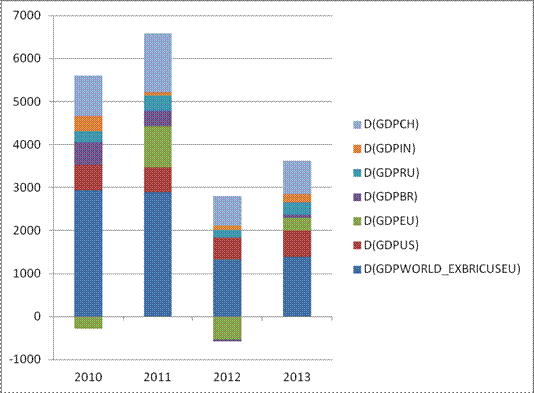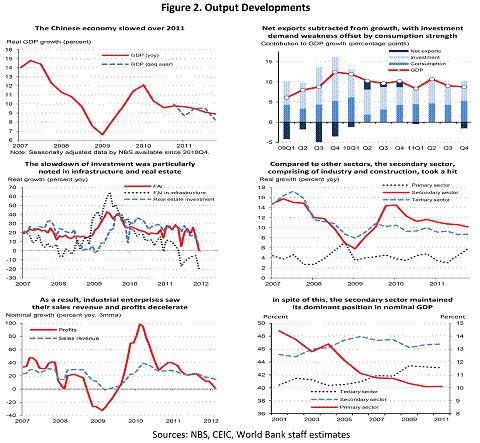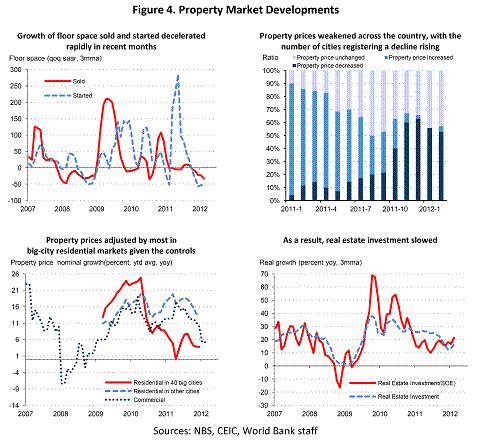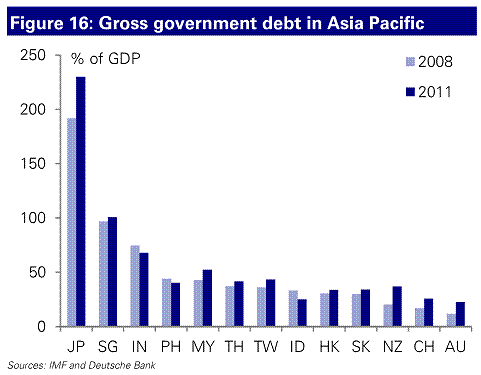Even before the newest portents of a slowdown, [0] it was clear that 2012 gains in world output were going to be highly reliant on Chinese growth. Figure 1 shows that the Eurozone switches to a net drag on world growth. China’s contribution is thus a much larger share of total world growth.

Figure 1: Increments to world GDP, in bn USD. China (light blue), India (orange), Russia (turquoise), Brazil (purple), Eurozone (green), US (red), and rest-of-world (blue). Source: IMF, World Economic Outlook, April 2012 database, and author’s calculations.
That is why the news from China is consequential (and I think the April IMF forecast is a little optimistic with respect to Eurozone growth, given recent developments, both policy and economic). From the World Bank’s China Quarterly Update, published in April:

Figure 2 from China Quarterly Update (April 2012).
Clearly, a slowdown is underway. In addition, a domestic source of growth –- namely the property market –- is cooling off.

Figure 4 from China Quarterly Update (April 2012).
With price pressures declining, China has some flexibility in terms of response. Monetary policy is easing already, by way of decreased reserve requirements. More likely fiscal policy will be stressed, as China has more fiscal space [1] than countries that engaged in reckless tax cuts at the beginning of the last decade [2]. (Although see Eswar Prasad’s arguments regarding how China should structure its fiscal response [3]

Figure 16 from Deutsche Bank, “What Can Asia Do?” Global Economic Perspectives (May 25, 2012) [not online].
Just because there is a government reaction function does not mean, however, that Chinese policymakers can actually hit the target. (Similarly, I think people are mistaken when they assert in the US context that because there is a Fed reaction function, a given output growth target can always be achieved.)
The slowdown in the BRICs and recession in the Eurozone (and the UK!) highlights the need to avoid the contractionary impact of ending extended unemployment benefits, the payroll tax rate reduction, and the provisions of EGTRRA and JGTRRA. [4]
I am always perplexed when Menzie puts up post like this. One that shows declining trends in the U.S., China, U.K., etc. and then ends it with a little PSA on the benefits of fiscal policy with not even a whisper of discussion on monetary policy. I’m perplexed because when pressed, Menzie will acknowledge the benefits to monetary policy. I suppose he just hasn’t realized that monetary policy moves last.
Is that gross government debt for China, does that include the provincial and sub provincial units as well or just the national government? Because it seems like Victor Shih has found a decent amount of evidence to show that when sub-state units are included the debt levels are significantly higher.
I’ve been toying with an idea that probably is as nuts as so many of the comments here. I’ll share anyway.
I’ve been reading about capital flowing out of China. My reading of this is that it reflects several things, from a natural reaction to such a prolonged investment boom to a desire for risk diversification. But I think one component may be that problems in Europe – heck, dispense with the word “problem” and say “impending disaster in Europe” – will create opportunity and it would be good, if you’re Chinese, to have money outside China if and when that occurs. I can imagine, for example, China restricting capital. Or that China’s currency continues to drop in value versus the dollar as our long terms yields approach ever closer to 0. If you want to take advantage of what may be a huge chance, it would be good to have the funds.
As for China’s economy, I agree there is room to stimulate activity given the perhaps unprecedented investment boom.
Menzie wrote:
Even before the newest portents of a slowdown, it was clear that 2012 gains in world output were going to be highly reliant on Chinese growth.
I often suggest that some read Hazlett’s Economics in One Lesson. His simple lesson would prevent so many economic errors.
China is not an island that imparts wealth to the rest of us. China is dependent on the economic health of the US and Europe. China is not an independent world that can pull the rest of us out of our stupidity. China is dependent almost entirely on exports. The growth of China is so intimately linked to the health of the importing nations that to separate them would be to kill both.
As Hazlitt teaches we must look at all of the ramifications of an economic event over the entire economic life of the event. To do otherwise is to invite fallacious analysis.
Pretty grizzly out there today.
I think the USA/Europe is the place to look for culprits of slowdown and worse things to come.
OT,
Menzie, this seems up your ally. I don’t think the jobs report is nearly as bad as it seems.
The number are seasonally adjusted and we had an unseasonable winter.
There was demand shift from spring to winter because of the winter and seasonal workers worked through winter. We had less job losses in the winter and people normally returning to work were already working. Using the normal seasonal adjustments likely mangified these differences.
Jeff: As usual, I don’t understand what you mean, particularly, when you say “when pressed”. After all, I’ve written on monetary policy here, here, here, etc.
Menzie: Then let me phrase it this way. Suppose the Fed adopts your conditional inflation targeting today. Then what would be the effect upon AD of extending unemployment benefits?
There is a logical inconsistency of arguing that both are expansionary, which you often do.
Jeff: Well, sure, if the economy transitioned instantaneously to the new steady state, and the Fed hit the target w/o any error, why additional fiscal stimulus would be redundant. But, forgive me, I don’t believe in frictionless economies, and believe in transition dynamics, in the presence of institutional lags, and real and nominal rigidities.
Menzie: Rambling off a list of semi-relevant terms is not a substitute for articulating a point. After sifting through the verbal salad it appears you are suggesting that fiscal policy is needed to fill in the gaps because monetary policy does not always hit its target. Now I really don’t think you are actually arguing that Congress has the ability to make better forecasts than the Fed. That would be an utterly ridiculous argument even for you. So I’m guessing you see fiscal policy’s role as one to complement monetary policy. But I remind you once again, monetary policy moves last! It is pointless to look at current monetary policy and try and identify some “room for improvement.” The Fed sets its targets and immediately accounts for all shock that may occur along the way, such as a fiscal policy shock. The Fed’s targets will be hit with or without the change in fiscal policy, the shock will have no effect on aggregate demand. So in short, no I don’t expect you to believe in frictionless markets but I do expect you to think about these problems intelligently and with consistency.
Jeff: For a person who has not written a single equation in any comment, nor linked to any as far as I can tell, the comment regarding “verbal salad” is amusing. All the terms “steady state”, “transition dynamics”, “institutional lags”, and “rigidities” are ones that are well established in the literature (I use them in my articles in peer reviewed journals — don’t you?), so I am pretty certain they are relevant. After all, in thinking about target inflation rates, expected equals actual on average only after reaching a “steady state” under the rational expectations hypothesis, for instance. Etc., etc.
And why do you keep on saying monetary policy moves last? Maybe it could move last, but since it’s not a unitary actor, sometimes it doesn’t move at all…All in all, I am touched by your faith that the central bank responds optimally to “… all shock [sic] that may occur along the way, such as a fiscal policy shock.”
Menzie: “Verbal salad” refers to the fact that you simply threw out a bunch of words together with no coherent point. I agree those are terms that are semi-related to the topic being discussed, but simply saying that you believe in transitional dynamics or nominal rigidities is a fairly vacuous statement. It strikes me as a fairly juvenile attempt to say “hey, I know important sounding words, I must know what I’m talking about!” I similarly interpret the jab about the lack of equations in my comments. Math helps formalize your arguments, but no amount of math can prop up faulty thinking. You should have learned this by now. Just because you can run a regression does not mean you are thinking about the problem correctly. I can tell any statistical package to do lots of ridiculous things.
As for your comment that sometimes monetary doesn’t move at all, this is an excellent example of how you have failed to properly think about the problem. What does it mean for monetary policy “not to move?” Every decision, to tighten, to loosen, or neither is a move. And this move will always happen after the fiscal policy is enacted. Maybe you would prefer to see a different move but you must nonetheless confront the fact that they will move. Your analysis pretends there is no subsequent move, which is simple nonsense. Do you also work out Cournot equilibrium with only one reaction function? These are basic game theory concept. Perhaps you should visit a few introductory texts to catch yourself up. I’m sure there are plenty of undergraduate level books that would be accessible for you.
Finally, your quote at the end mischaracterizes my point. I will give you the benefit of the doubt and assume it stemmed from your misunderstanding rather than something malicious. I did not say that monetary policy always responds optimally. I said they have their targets and they aim for them. Those targets may or may not be optimal, but once again we can’t ignore them and assume the Fed will not be trying with all its effort to hit those targets.
Jeff: ok, no such thing as transitional dynamics. Got it.
Even before the newest portents of a slowdown, it was clear that 2012 gains in world output were going to be highly reliant on Chinese growth.
I often suggest that some read Hazlett’s Economics in One Lesson. His simple lesson would prevent so many economic errors.
China is not an island that imparts wealth to the rest of us. China is dependent on the economic health of the US and Europe. China is not an independent world that can pull the rest of us out of our stupidity. China is dependent almost entirely on exports. The growth of China is so intimately linked to the health of the importing nations that to separate them would be to kill both.
As Hazlitt teaches we must look at all of the ramifications of an economic event over the entire economic life of the event. To do otherwise is to invite fallacious analysis.
An interesting article, especially the first chart. However, I am unable to understand a couple of points. For instance, “In addition, a domestic source of growth –- namely the property market… ”
Unlike many countries, property market in China is not just a domestic source of growth – even though it is physically as domestic as it gets. A large section of Chinese property developments are created in response to external demand. To export from China, firms needs factories, associated commercial space and finally dependent residential space. If export is not there – none of these will be needed. And this is more pronounced in the coastal China. So, if primary importers such as US and EU are not growing and not increasing imports, this massive chunk of real-estate demand evaporates. So, I would tend to think Chinese real-estate as both domestic as well as external source of growth.